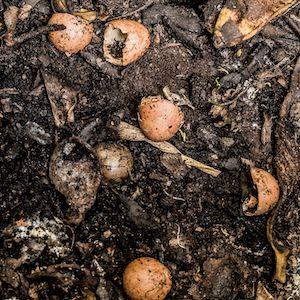When you think about death, what sort of thoughts come to mind?
If you're like most people, you probably think about family and (if you believe in one) the afterlife. Will my spouse and kids be okay? Did I lead a good life? Will I see my deceased loved ones again?
A company named Recompose in Washington State is betting that your biggest question will be, "How can I minimize my corpse's environmental impact?" This is the same state that has Seattle in it, so it's not a bad bet. Now, the Seattle Times reports that Washington has become the first state to legalize human composting.
In Washington State, You Can Compost Table Scraps... and Grandpa, Too!
Though few details are provided, the company's website envisions a facility in which a single corpse is placed into a large vessel. Inside the vessel are thermophilic (heat-loving) microbes, and the internal environment (e.g., moisture and the amount of carbon, oxygen, and nitrogen) is tightly controlled. At the end of the process, which takes about a month, the corpse is converted into odorless soil. (And you can take some home, if you'd like!)
It's clear that Recompose has thought this through quite well. For example, the company refuses to accept the bodies of people who died of infectious microorganisms that may not be destroyed during the composting process, such as prion disease or Ebola. So, the process appears to be safe for humans and the environment. But why would anyone want to do this?
Justification for Human Composting Is Based on Flimsy Science
Recompose provides three main reasons why it believes human composting is superior to other methods of disposition, but two of them are complete nonsense. The biggest reason, repeated over and over on the website, is this:
"[W]e estimate that a metric ton of CO2 will be saved each time someone chooses recomposition over cremation or conventional burial."
Assuming that number is correct, it's entirely meaningless. There are two facts that must be considered: (1) About 36 billion metric tons of CO2 are emitted globally each year; and (2) About 57 million people die each year. If every dead person was composted, that means we would emit 35.95 billion metric tons of CO2 instead of 36 billion. In other words, the amount of carbon sequestered is a rounding error.
The second reason Recompose uses to justify human composting is to "avoid polluting groundwater with embalming fluid." However, there is no reason to believe that happens to any appreciable extent, which means this is a solution in search of a problem.
The third reason is the only good one: Human composting saves space in crowded cities. In Greece, cemeteries are also overcrowded. According to BBC, it is common for the dead to be buried for only three years, after which the body is exhumed and the bones placed in an ossuary. In Britain, some places stack coffins in a single grave.
Human Composting vs. Cremation
Is human composting worth it? Probably not. The reduction in carbon emissions is negligible. From a space-saving perspective, composting certainly is superior to traditional burial. However, cremation also accomplishes that, and likely at a lower price because it is far less labor intensive than the month-long composting process.
But if you choose to be composted, may you R.I.P.: Rot in peace.




